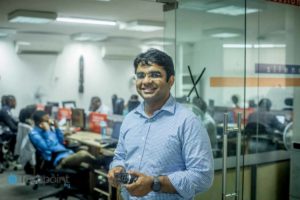VConnect Founder Deepankar Rustagi explains why Africa is the place to be and why African SMEs are the future of the continent’s prosperity.
Welcome to Mob76 Outlook, Deepankar. Tell us about VConnect.
We are based in Lagos, Nigeria and we want to be the leading player in Anglophone countries with high internet penetration in Africa. The market is there. According to NBS, the market for online demand-in service-businesses will be $3.6 billion by 2020.
We are playing a critical role in the growth of African SMEs and transforming the way service sector businesses engage with their customers.
To many people, Africa is the so-called Dark Continent, but what’s really happening there right now?
The economic challenges faced by Africa (its dependence on oil, and the non-existence of the middle class) are not hidden from anyone. Providing growth to SMEs in the service sector will append a more dependable stream of revenue.
What is your company doing to help?
We want to transform local SMEs into emerging brands in Africa. More than 75% of SMEs in Africa do not survive the second year of operations. Access to market is one of the major challenges faced by these SMEs.
VConnect is a platform for finding local service professionals and allows users to search for and connect with service businesses to access reliable and affordable services.
We enable businesses to acquire and, more importantly, retain customers by making them more accessible online. Businesses need to take just three easy steps: register on VConnect, respond to enquiries from potential customers and engage to transact.
Our platform is unique as it is easy enough for the SMEs in Africa to promote themselves online using their mobile phones. We help them create their business profile and generate and manage leads for their products and services.
Why did you set up the company?
I grew up in Lagos and have spent more than 18 years here. After engineering work brought me back to Lagos, I noticed the difficulty people faced in finding businesses and how difficult it was for businesses to market themselves and reach their customers. That’s when we decided to start VConnect.
How much traction does VConnect have?
* 1.5 Million monthly users
* 2,000 SMEs actively engage with customers every day
* 15,000 connections made every day(no. of times users get in touch with businesses)
* 75% are mobile users (both businesses and users)
Who are your major competitors?
They are Connect Nigeria, Finelib, Businesslist.ng, Jiji.ng and Olx
Why are you better and different from these other players?
We are an SME tech company, changing the way businesses in Sub-Saharan Africa acquire and engage with customers. We enable businesses to not just generate leads and acquire new customers but also, to retain them, whereas our competitors only enable the business to be listed on their platforms.
As for users, unlike our competitors, we don’t just provide contact information of service professionals but understand users’ requirement and connect them with multiple reliable service professionals for them to get maximum value for their money.
How much funding have you received to this point?
$US5.5 million
Tell us about your founders and team
We are a single founder company and our team consists of 57 people. I founded the company in March, 2011 and have since worked with my team as the CEO, overseeing product development, management, and engagement. During this course, I’ve also completed a Venture Capital program from Haas School of Business, Berkeley and an entrepreneurship course from Stanford SEED, West Africa.
Our core team encompasses of product management, business development, sales, operations, finance, digital marketing and brand/category management all run from our base office in Lagos.
Our CTO is a seasoned programmer with 14 years of experience and has been a part of VConnect since its inception. Our product and marketing heads both have more than eight years of experience in defining the growth path for startups in Asian countries.
Very interesting, Deepaankar, thanks for sharing your story with our audience.
My pleasure, thanks for inviting, me.

